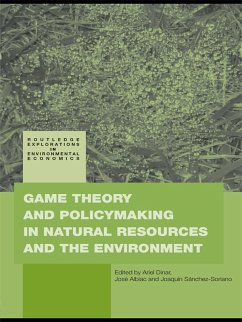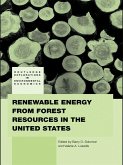Game Theory and Policy Making in Natural Resources and the Environment (eBook, PDF)
Redaktion: Dinar, Ariel; Sánchez-Soriano, Joaquín; Albiac, José
57,95 €
57,95 €
inkl. MwSt.
Sofort per Download lieferbar

29 °P sammeln
57,95 €
Als Download kaufen

57,95 €
inkl. MwSt.
Sofort per Download lieferbar

29 °P sammeln
Jetzt verschenken
Alle Infos zum eBook verschenken
57,95 €
inkl. MwSt.
Sofort per Download lieferbar
Alle Infos zum eBook verschenken

29 °P sammeln
Game Theory and Policy Making in Natural Resources and the Environment (eBook, PDF)
Redaktion: Dinar, Ariel; Sánchez-Soriano, Joaquín; Albiac, José
- Format: PDF
- Merkliste
- Auf die Merkliste
- Bewerten Bewerten
- Teilen
- Produkt teilen
- Produkterinnerung
- Produkterinnerung

Bitte loggen Sie sich zunächst in Ihr Kundenkonto ein oder registrieren Sie sich bei
bücher.de, um das eBook-Abo tolino select nutzen zu können.
Hier können Sie sich einloggen
Hier können Sie sich einloggen
Sie sind bereits eingeloggt. Klicken Sie auf 2. tolino select Abo, um fortzufahren.

Bitte loggen Sie sich zunächst in Ihr Kundenkonto ein oder registrieren Sie sich bei bücher.de, um das eBook-Abo tolino select nutzen zu können.
This book includes chapters by experts from developing and developed countries that apply game theory to issues in natural resources and the environment, demonstrating the usefulness of game theory in policy-making and appealing to a wide audience.
- Geräte: PC
- mit Kopierschutz
- eBook Hilfe
- Größe: 3.03MB
Andere Kunden interessierten sich auch für
![Natural Resources (eBook, PDF) Natural Resources (eBook, PDF)]() Judith ReesNatural Resources (eBook, PDF)54,95 €
Judith ReesNatural Resources (eBook, PDF)54,95 €![Natural Resource Economics (eBook, PDF) Natural Resource Economics (eBook, PDF)]() Tom TietenbergNatural Resource Economics (eBook, PDF)86,95 €
Tom TietenbergNatural Resource Economics (eBook, PDF)86,95 €![The Role of Science for Conservation (eBook, PDF) The Role of Science for Conservation (eBook, PDF)]() The Role of Science for Conservation (eBook, PDF)51,95 €
The Role of Science for Conservation (eBook, PDF)51,95 €![The Economics of Natural Resources in Latin America (eBook, PDF) The Economics of Natural Resources in Latin America (eBook, PDF)]() The Economics of Natural Resources in Latin America (eBook, PDF)43,95 €
The Economics of Natural Resources in Latin America (eBook, PDF)43,95 €![Environmental Economics and Ecosystem Services (eBook, PDF) Environmental Economics and Ecosystem Services (eBook, PDF)]() Randall BluffstoneEnvironmental Economics and Ecosystem Services (eBook, PDF)54,95 €
Randall BluffstoneEnvironmental Economics and Ecosystem Services (eBook, PDF)54,95 €![Renewable Energy from Forest Resources in the United States (eBook, PDF) Renewable Energy from Forest Resources in the United States (eBook, PDF)]() Renewable Energy from Forest Resources in the United States (eBook, PDF)45,95 €
Renewable Energy from Forest Resources in the United States (eBook, PDF)45,95 €![Biophysical Economy (eBook, PDF) Biophysical Economy (eBook, PDF)]() Steven M. BartellBiophysical Economy (eBook, PDF)94,95 €
Steven M. BartellBiophysical Economy (eBook, PDF)94,95 €-
-
-
This book includes chapters by experts from developing and developed countries that apply game theory to issues in natural resources and the environment, demonstrating the usefulness of game theory in policy-making and appealing to a wide audience.
Dieser Download kann aus rechtlichen Gründen nur mit Rechnungsadresse in A, B, BG, CY, CZ, D, DK, EW, E, FIN, F, GR, HR, H, IRL, I, LT, L, LR, M, NL, PL, P, R, S, SLO, SK ausgeliefert werden.
Produktdetails
- Produktdetails
- Verlag: Taylor & Francis eBooks
- Seitenzahl: 368
- Erscheinungstermin: 31. Januar 2008
- Englisch
- ISBN-13: 9781135976101
- Artikelnr.: 43074848
- Verlag: Taylor & Francis eBooks
- Seitenzahl: 368
- Erscheinungstermin: 31. Januar 2008
- Englisch
- ISBN-13: 9781135976101
- Artikelnr.: 43074848
- Herstellerkennzeichnung Die Herstellerinformationen sind derzeit nicht verfügbar.
Ariel Dinar is a Professor of Environmental Economics and Policy, and Director Water Science and Policy Center, University of California, Riverside, USA. He was formerly Lead Economist of the Development Research Group at the World Bank, USA. His research focuses on international water and cooperation, approaches to stable water allocation agreements, water and climate change, economics of water quantity/quality, and economic aspects of policy interventions and institutional reforms. His most recent undertaking is the RFF book series "Issues in Water Resource Policy" that aims to produce publications on contemporary water policy issues in various countries and states. Jose Albiac is a Research Fellow at CITA, an agricultural research centre of the Government of Aragón, Zaragoza, Spain. Joaquín Sánchez-Soriano is an Associate Professor at the Department of Statistics, Mathematics and Computer Science of the University Miguel Hernández, Elche, Spain.
1. Introduction: Game Theory - A Useful Approach for Policy Evaluation in
Natural Resource and Environment? 2. Game Theory and the Development of
Resource Management Policy: The Case of International Fisheries 3.
Traditional Grazing Rights in Sub-Saharan Africa and the Role of Policy 4.
Application of Partition Function Games to the Management of Straddling
Fish Stocks 5. To Negotiate or to Game Theorize: Evaluating Water
Allocation Mechanisms in the Kat Basin, South Africa 6. Cooperation and
Equity in the River Sharing Problem 7. Negotiation over the Allocation of
Water Resources: The Strategic Importance of Bargaining Structure 8.
Rural-Urban Water Transfers with Applications to the U.S./Mexico Border
Region 9. WAS-guided Cooperation in Water Management: Coalitions and
Gains 10. Experimental Insights into the Efficiency of Alternative Water
Management Institutions 11. A Fair Tariff System for Water Management 12.
Game-Theoretic Modeling of Water Allocation Regimes Applied to the Yellow
River Basin in China 13. Contributions of Game Theory to the Analysis of
Consumer Boycotts 14. How does Environment Awareness Arise?: An
Evolutionary Approach 15. Effects of Alternative CDM Baseline Schemes
Under an Imperfectly Competitive Market Structure
Natural Resource and Environment? 2. Game Theory and the Development of
Resource Management Policy: The Case of International Fisheries 3.
Traditional Grazing Rights in Sub-Saharan Africa and the Role of Policy 4.
Application of Partition Function Games to the Management of Straddling
Fish Stocks 5. To Negotiate or to Game Theorize: Evaluating Water
Allocation Mechanisms in the Kat Basin, South Africa 6. Cooperation and
Equity in the River Sharing Problem 7. Negotiation over the Allocation of
Water Resources: The Strategic Importance of Bargaining Structure 8.
Rural-Urban Water Transfers with Applications to the U.S./Mexico Border
Region 9. WAS-guided Cooperation in Water Management: Coalitions and
Gains 10. Experimental Insights into the Efficiency of Alternative Water
Management Institutions 11. A Fair Tariff System for Water Management 12.
Game-Theoretic Modeling of Water Allocation Regimes Applied to the Yellow
River Basin in China 13. Contributions of Game Theory to the Analysis of
Consumer Boycotts 14. How does Environment Awareness Arise?: An
Evolutionary Approach 15. Effects of Alternative CDM Baseline Schemes
Under an Imperfectly Competitive Market Structure
1. Introduction: Game Theory - A Useful Approach for Policy Evaluation in
Natural Resource and Environment? 2. Game Theory and the Development of
Resource Management Policy: The Case of International Fisheries 3.
Traditional Grazing Rights in Sub-Saharan Africa and the Role of Policy 4.
Application of Partition Function Games to the Management of Straddling
Fish Stocks 5. To Negotiate or to Game Theorize: Evaluating Water
Allocation Mechanisms in the Kat Basin, South Africa 6. Cooperation and
Equity in the River Sharing Problem 7. Negotiation over the Allocation of
Water Resources: The Strategic Importance of Bargaining Structure 8.
Rural-Urban Water Transfers with Applications to the U.S./Mexico Border
Region 9. WAS-guided Cooperation in Water Management: Coalitions and
Gains 10. Experimental Insights into the Efficiency of Alternative Water
Management Institutions 11. A Fair Tariff System for Water Management 12.
Game-Theoretic Modeling of Water Allocation Regimes Applied to the Yellow
River Basin in China 13. Contributions of Game Theory to the Analysis of
Consumer Boycotts 14. How does Environment Awareness Arise?: An
Evolutionary Approach 15. Effects of Alternative CDM Baseline Schemes
Under an Imperfectly Competitive Market Structure
Natural Resource and Environment? 2. Game Theory and the Development of
Resource Management Policy: The Case of International Fisheries 3.
Traditional Grazing Rights in Sub-Saharan Africa and the Role of Policy 4.
Application of Partition Function Games to the Management of Straddling
Fish Stocks 5. To Negotiate or to Game Theorize: Evaluating Water
Allocation Mechanisms in the Kat Basin, South Africa 6. Cooperation and
Equity in the River Sharing Problem 7. Negotiation over the Allocation of
Water Resources: The Strategic Importance of Bargaining Structure 8.
Rural-Urban Water Transfers with Applications to the U.S./Mexico Border
Region 9. WAS-guided Cooperation in Water Management: Coalitions and
Gains 10. Experimental Insights into the Efficiency of Alternative Water
Management Institutions 11. A Fair Tariff System for Water Management 12.
Game-Theoretic Modeling of Water Allocation Regimes Applied to the Yellow
River Basin in China 13. Contributions of Game Theory to the Analysis of
Consumer Boycotts 14. How does Environment Awareness Arise?: An
Evolutionary Approach 15. Effects of Alternative CDM Baseline Schemes
Under an Imperfectly Competitive Market Structure







